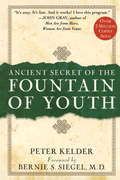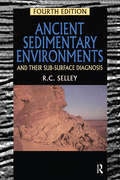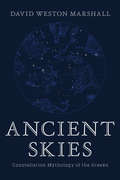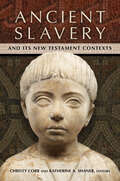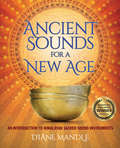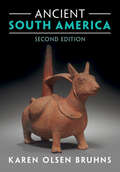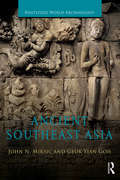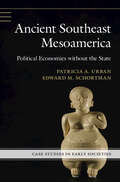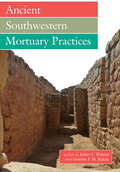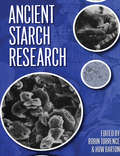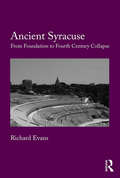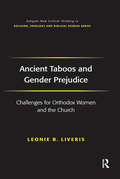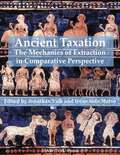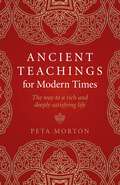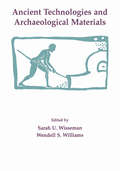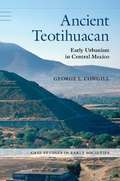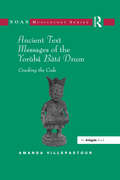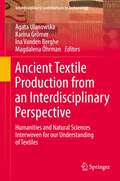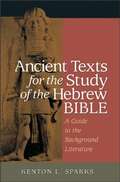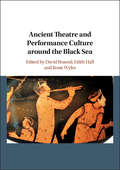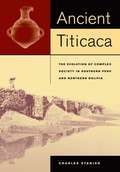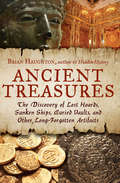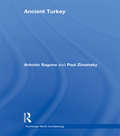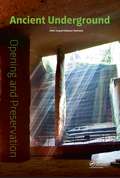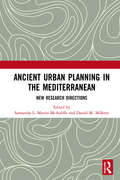- Table View
- List View
Ancient Secrets of the Fountain of Youth
by Peter KelderLegend has it that hidden in the remote reaches of the Himalayan mountains lies a secret that would have saved Ponce de Leon from years of fruitless searching. There, generations of Tibetan monks have passed down a series of exercises with mystical, age-reversing properties. Known as the Tibetan Rites of Rejuvenation or the Five Rites, these once-secret exercises are now available to Westerners inAncient Secret of the Fountain Of Youth. Peter Kelder's book begins with an account of his own introduction to the rites by way of Colonel Bradford, a mysterious retired British army officer who learned of the rites while journeying high up in the Himalayas. Fountain of Youththen offers practical instructions for each of the five rites, which resemble yoga postures. Taking just minutes a day to perform, the benefits for practitioners have included increased energy, weight loss, better memory, new hair growth, pain relief, better digestion, and just feeling younger.
Ancient Sedimentary Environments: And Their Sub-surface Diagnosis
by Selley, Richard C.This edition retains the case history approach to emphasize the subsurface diagnosis of environments using seismic and geophysical well logs and their application to petroleum exploration and production. This book should be of interest to undergraduates in sedimentology and petroleum geology.
Ancient Skies: Constellation Mythology Of The Greeks
by David Weston MarshallLook to the sky and see the stories in the stars The stars and constellations are among the few remaining objects that appear to us just as they appeared to our distant ancestors. From anywhere on Earth, a person may view the celestial panorama simply by stepping outside at night and gazing upward. This non- fiction narrative presents the tales of the forty- eight classical constellations, compiled from literature spanning a thousand years from Homer (c. 800 BC) to Claudius Ptolemy (c. 150 AD). These age- old tales have captured the human imagination from ancient times to the present, and through them we can examine the early practical astronomy, philosophical speculation on the cosmos, and fundamental moral beliefs of much of Western civilization. Illustrations and star charts carefully reconstructed from ancient sources lend a visual element and immerse the reader in the world of ancient cosmology and constellation mapping. Through Marshall’s research and storytelling, Ancient Skies brings the belief systems of the classical world to shining life.
Ancient Slavery and Its New Testament Contexts
by Christy CobbAn essential resource for understanding slavery in the New Testament and early Christianity Slavery permeated society in the ancient world. The realities of slavery and its shadows pervade the New Testament and other early Christian texts. Yet enslavement remains an under-taught aspect of the context of the New Testament and early Christianity. Because of this, readers are left with numerous questions about ancient slavery. How did people become enslaved? What kinds of work did enslaved people do? Who enslaved people? How did ancient slavery compare with more contemporary enslavement eras? Did anyone in the ancient world criticize slavery? Was ancient slavery racialized? Did Christians have a different understanding of slavery than others? These are just some of the questions students ask in higher education and in Bible study classrooms alike. This volume takes on these questions, introducing students to the textures, complexities, and material realities of slavery in the Greco-Roman world. Ancient Slavery and Its New Testament Contexts draws on the expertise of scholars around the world with a focus on introductory information, accessibility, and readability. It does not attempt to dismiss or downplay the role of New Testament texts in the perpetuation of either ancient slavery or slavery in the North American context. Rather, the volume helps students and teachers alike wrestle with the ongoing historical, theological, and ethical legacies of slavery in their own faith formation and engagement with the biblical text.
Ancient Sounds for a New Age: An Introduction to Himalayan Sacred Sound Instruments
by Diáne MandleAncient Sounds for a New Age is an introduction to and overview of sound healing with Himalayan instruments. It offers a clear idea of what is needed to learn and practice for anyone who decides to enter the field, and serves as an instructional tool to that end. Diáne has combined techniques from other fields that have proven very effective for her clients and describe these in the book. As an extra bonus, exclusive access to a digital one-hour instructional video is included to demonstrate Diáne’s methods as a practitioner. The book is organized in five parts. The first, Part I: Fundamentals of Sound Healing, offers an orientation to the work. Part II: The Sacred Sound Family, teaches about the sound healing instruments—the tingshas, the ganta and dorje, and the Himalayan bowls—and the author takes you through some basic configurations for working with multiple instruments. Part III: Sound Healing and the Chakras, offers a breakdown of techniques and principles for working with the body’s main energy centers, the chakras. Part IV: Working with Challenging Emotions, offers brief orientations to working with anxiety and depression, dedicating one chapter to each. The last main section of the book, Part V: Enhancing Your Practice, concerns ways to include other modalities in a sound healing session, and the author shares some that have worked well in her own practice. Diane explores colors and toning, power language, and visualization, reminding the reader, “In learning to practice sound healing, we are aspiring to become more than technicians who can play the instruments—we are developing into healers.” Additionally, several Appendices include: thumbnail profiles of some sound healing pioneers, an interesting case study, some client testimonials, and further resources, including information about Diane’s school and some of the classes and products offered. “Diáne Mandle is the preeminent voice in the field of Tibetan bowl sound healing. Her book, Ancient Sounds for the New Age, offers a platform of deep understanding on which a practical skill set can be easily built upon. This is what the emerging field of sound healing has been waiting for. There is no doubt that it will soon be recognized as the go-to resource for serious vibrational practitioners.”—Richard Rudis (Karma Sonam Dorje) “Diane Mandle's Tibetan Bowels were part of the Integrative Medical Care offered at the San Diego Cancer and Research Institute. Our patients found her sounds magical, therapeutic, meditative and leading to an inner sense of peace and well-being.” —Paul Brenner M.D, PhD “In Ancient Sounds for a New Age, Diane reveals how to use the Tibetan bowls, tingshas, ganta, and dorgje to transform problems into doorways of light. I've personally experienced her ability to awaken the music of the soul and open to the blessings of harmony, and now with this indispensable book, you can too.”—Cyndi Dale, Intuitive, healer, and author of many bestselling books including The Subtle Body, The Intuition Guidebook, The Complete Book of Chakras, Energetic Boundaries
Ancient South America
by Karen Olsen BruhnsAncient South America, 2nd edition features the full panorama of the South American past from the first inhabitants to the European invasions Isolated for all of prehistory and much of history, the continent witnessed the rise of cultures and advanced civilizations rivalling those of Europe, Asia, and Africa. Independently of developments elsewhere, South American peoples invented agriculture, domesticated animals, and created pottery, elaborate architecture, and the arts of working metals. Tribes, chiefdoms, and immense conquest states rose, flourished, and disappeared, leaving only their ruined monuments and broken artifacts as testimonials to past greatness. This new edition is completely revised and updated to reflect archaeological discoveries and insights made in the past three decades. Incorporating new findings on northern and eastern lowlands, and discussions of the first civilizations, it also examines the first inhabitants of Brazil and Patagonia as well as the Andes. Accessibly written and abundantly illustration, the volume also includes chronological charts and new examples.
Ancient Southeast Asia (Routledge World Archaeology)
by John Norman Miksic Goh Geok YianAncient Southeast Asia provides readers with a much needed synthesis of the latest discoveries and research in the archaeology of the region, presenting the evolution of complex societies in Southeast Asia from the protohistoric period, beginning around 500BC, to the arrival of British and Dutch colonists in 1600. Well-illustrated throughout, this comprehensive account explores the factors which established Southeast Asia as an area of unique cultural fusion. Miksic and Goh explore how the local population exploited the abundant resources available, developing maritime transport routes which resulted in economic and cultural wealth, including some of the most elaborate art styles and monumental complexes ever constructed. The book’s broad geographical and temporal coverage, including a chapter on the natural environment, provides readers with the context needed to understand this staggeringly diverse region. It utilizes French, Dutch, Chinese, Malay-Indonesian and Burmese sources and synthesizes interdisciplinary theoretical perspectives and data from archaeology, history and art history. Offering key opportunities for comparative research with other centres of early socio-economic complexity, Ancient Southeast Asia establishes the area’s importance in world history.
Ancient Southeast Mesoamerica: Political Economies without the State (Case Studies in Early Societies)
by Patricia A. Urban Edward M. SchortmanAncient Southeast Mesoamerica explores the distinctive development and political history of the region from its earliest inhabitants up to the Spanish conquest. It was composed of a matrix of social networks rather than divided by distinct cultures and domains. Making use of the area's rich archaeological data, Edward Schortman and Patricia Urban provide a social network analysis of southeast Mesoamerica. They demonstrate how inhabitants from different locales were organized within such networks, and how they mobilized the assets that they needed to define and achieve their own goals. The also provide evidence for the actions of other groups, who sought to promote their importance at local and regional scales, and often opposed those efforts. Schortman and Urban's study demonstrates the fresh insights gained from study of socio-political structures via a social network perspective. It also challenges models that privilege the influence of powerful leaders in shaping those structures.
Ancient Southwestern Mortuary Practices
by James T. Watson Gordon F. M. RakitaAncient Southwestern Mortuary Practices chronicles the modal patterns, diversity, and change of ancient mortuary practices from across the US Southwest and northwest Mexico over four thousand years of Prehispanic occupation. The volume summarizes new methodological approaches and theoretical issues concerning the meaning and importance of burial practices to different peoples at different times throughout the ancient Greater Southwest. Chapters focus on normative mortuary patterns, the range of variability of mortuary patterns, how the contexts of burials reflect temporal shifts in ideology, and the ways in which mortuary rituals, behaviors, and funerary treatments fulfill specific societal needs and reflect societal beliefs. Contributors analyze extensive datasets—archived and accessible on the Digital Archaeological Record (tDAR)—from various subregions, structurally standardized and integrated with respect to biological and cultural data. Ancient Southwestern Mortuary Practices, together with the full datasets preserved in tDAR, is a rich resource for comparative research on mortuary ritual for indigenous descendant groups, cultural resource managers, and archaeologists and bioarchaeologists in the Greater Southwest and other regions. Contributors: Nancy J. Akins, Jessica I. Cerezo-Román, Mona C. Charles, Patricia A. Gilman, Lynne Goldstein, Alison K. Livesay, Dawn Mulhern, Ann Stodder, M. Scott Thompson, Sharon Wester, Catrina Banks Whitley
Ancient Starch Research
by Robin Torrence Huw BartonWhat role did plant resources have in the evolution of the human species? Why and how have plants been managed and transported to new environments? Where, how, and why were plants domesticated, and why do the patterns vary in different parts of the world? What is the relationship between the intensification of food production and the rise of complex societies? Numerous new studies are using starch granules discovered in archaeological contexts to answer these questions and improve our knowledge of past human behavior and environmental variation. Given the substantial body of successful research, the time has clearly come for a comprehensive description of ancient starch research and its potential for archaeologists. This book fills these roles by describing the fundamental principles underlying starch research, guiding researchers through the methodology, reviewing the results of significant case studies, and pointing the way to future avenues for research. The joint product of over two dozen archaeological scientists, Ancient Starch Research aims to bring the important new field of ancient starch analysis to the attention of a wider range of scholars and to provide them with the information needed to embark on their own research.
Ancient Syracuse: From Foundation to Fourth Century Collapse
by Richard EvansSyracuse possesses a unique place in the history of the ancient Mediterranean because of its contribution to Greek culture and political thought and practice. Even in the first century BC Cicero could still declare ’You have often heard that of all the Greek cities Syracuse is the greatest and most beautiful.’ Sicily’s strategic location in the Mediterranean brought the city prosperity and power, placing it in the first rank of states in the ancient world. The history and governance of the city were recorded from the fifth century BC and the volume of literary sources comes close to matching the records of Athens or Rome. Combining literary and material evidence this monograph traces the history of Syracuse, offering new arguments about the date of the city’s foundation, and continues through the fifth century when, as a democracy, Syracuse’s military strength grew to equal that of Athens or Sparta, surpassing them in the early fourth century under the tyrant Dionysius I. From ca. 350 BC, however, the city’s fortunes declined as the state was wracked with civil strife as the tyranny lost control. The result was a collapse so serious that the city faced complete and imminent destruction.
Ancient Taboos and Gender Prejudice: Challenges for Orthodox Women and the Church (Routledge New Critical Thinking in Religion, Theology and Biblical Studies)
by Leonie B. LiverisThis book explores the struggling genesis of a women's movement in the Orthodox Church through the ecumenical movement of the twentieth century at a time when militant conservatism is emerging in Orthodox countries and fundamentalism in the diaspora. Offering an understanding of the participation of women in the Orthodox Church, particularly during the 50 years of the membership of the Orthodox churches in the World Council of Churches, this book contributes to the ongoing debates and feminist analysis of women's participation, ministry and sexuality in the life and practice of the Church universal. The book reveals both the positive contributions to ecumenism and the difficulties confronting Orthodox women wishing to participate more fully in the leadership and ministry of their church.
Ancient Taxation: The Mechanics of Extraction in Comparative Perspective (ISAW Monographs #11)
by Jonathan Valk and Irene Soto MarínA collection of studies that explores the extractive systems of eleven ancient states and societies from across the ancient worldAncient Taxation is a collection of studies that explores the extractive systems of eleven ancient states and societies from across the ancient world, ranging from Bronze Age China to Anglo-Saxon Britain. The contributors discuss the inherent challenges of taxation in predominantly agro-pastoral societies, including basic tax strategy (e.g., taxing goods vs. labor, in-kind vs. money taxes, etc.); the mechanics of assessment and collection; and the politics of negotiating the cooperation of social, economic, and political élites and other important social groups. In assembling a broad range of studies, this book sheds new light on the commonalities and differences between ancient taxation systems, and so on the broader fiscal and institutional practices of antiquity. It also provides new impetus for further comparative research into extractive practices across ancient societies and between antiquity and recent historical periods.The book will be of interest to those studying ancient social and economic history, the history of social organization, and the history of ancient Greece and Rome, Egypt, the Ancient Near East, or ancient China.
Ancient Teachings for Modern Times: The Way To a Rich and Deeply Satisfying Life
by Peta MortonIs your life fulfilling? Do you feel loved and valued? Are you full of energy, happy and healthy? Are your days inspiring and fun? This remarkable book shows you how to stop the struggle and embrace life. Peta Morton shares the timeless spiritual wisdom of the ages in a modern, non-religious context and invites you on a journey of self-discovery. 'Peta Morton elegantly weaves together practical wisdom from a diverse array of traditions to provide a 'one stop shop' for anyone interested in personal development and well-being. This synthesis of important teachings and modalities, ranging from the power of breathing, thoughts, gratitude, and beyond, has the potential to shift the reader's perspective and clears the path for a happier, more peaceful life. Mark Gober, author of An End to Upside Down Thinking
Ancient Technologies and Archaeological Materials
by Sarah U. Wisseman Wendell S. WilliamsFirst Published in 1993. Routledge is an imprint of Taylor & Francis, an informa company.
Ancient Teotihuacan: Early Urbanism In Central Mexico (Case Studies In Early Societies)
by George CowgillThis is the first comprehensive English-language book on the largest city in the Americas before the 1400s. Teotihuacan is a UNESCO world heritage site, located in highland central Mexico, about twenty-five miles from Mexico City, visited by millions of tourists every year. The book begins with Cuicuilco, a predecessor that arose around 400 BCE, then traces Teotihuacan from its founding in approximately 150 BCE to its collapse around 600 CE. It describes the city's immense pyramids and other elite structures. It also discusses the dwellings and daily lives of commoners, including men, women, and children, and the craft activities of artisans. George L. Cowgill discusses politics, economics, technology, art, religion, and possible reasons for Teotihuacan's rise and fall. Long before the Aztecs and 800 miles from Classic Maya centers, Teotihuacan was part of a broad Mesoamerican tradition but had a distinctive personality that invites comparison with other states and empires of the ancient world.
Ancient Text Messages of the Yoruba Bata Drum: Cracking the Code (SOAS Studies in Music)
by Amanda VillepastourThe bata is one of the most important and representative percussion traditions of the people in southwest Nigeria, and is now learnt and performed around the world. In Cuba, their own bata tradition derives from the Yoruba bata from Africa yet has had far more research attention than its African predecessor. Although the bata is one of the oldest known Yoruba drumming traditions, the drum and its unique language are now unfamiliar to many contemporary Yoruba people. Amanda Villepastour provides the first academic study of the bata's communication technology and the elaborate coded spoken language of bata drummers, which they refer to as 'ena bata'. Villepastour explains how the bata drummers' speech encoding method links into universal linguistic properties, unknown to the musicians themselves. The analysis draws the direct links between what is spoken in Yoruba, how Yoruba is transformed in to the coded language (ena), how ena prescribes the drum strokes and, finally, how listeners (and which listeners) extract linguistic meaning from what is drummed. The description and analysis of this unique musical system adds substantially to what is known about bata drumming specifically, Yoruba drumming generally, speech surrogacy in music and coded systems of speaking. This book will appeal not only to ethnomusicologists and anthropologists, but also to linguists, drummers and those interested in African Studies.
Ancient Textile Production from an Interdisciplinary Perspective: Humanities and Natural Sciences Interwoven for our Understanding of Textiles (Interdisciplinary Contributions to Archaeology)
by Karina Grömer Agata Ulanowska Ina Vanden Berghe Magdalena ÖhrmanThe diverse developments in textile research of the last decade, along with the increased recognition of the importance of textile studies in adjacent fields, now merit a dedicated, full-length publication entitled “Ancient Textile Production from an Interdisciplinary Perspective: Humanities and Natural Sciences Interwoven for our Understanding of Textiles”. With this volume, the authors and the editors wish to illustrate to the current impact of textile archaeology on the scholarly perception of the past (not limited to archaeology alone). The volume presents new insights into the consumption, meaning, use and re-use of textiles and dyes, all of which are topics of growing importance in textile research. As indicated by the title, we demonstrate the continued importance of interdisciplinarity by showcasing several ‘interwoven’ approaches to environmental and archaeological remains, textual and iconographic sources, archaeological experiments and ethnographic data, from a large area covering Europe and the Mediterranean, Near East, Africa and Asia. The chronological span is deliberately wide, including materials dating from c. 6th millennium BCE to c. mid-14th century CE. The volume is organised in four parts that aim to reflect the main areas of the textile research in 2020. After the two introductory chapters (Part I: About this Volume and Textile Research in 2020), follow two chapters referring to dyes and dyeing technology in which analytical and material-based studies are linked to contextual sources (Part II: Interdisciplinarity of Colour: Dye Analyses and Dyeing Technologies). The six chapters of Part III: Interdisciplinary Approaches to Textile Tools discuss textiles and textile production starting from the analyses of tools, whether functional or as representative of technological developments or user identity. Archaeological and cultural contexts as well as textile traditions are the main topics of the six chapters in Part IV: Traditions and Contexts: Fibres, Fabrics, Techniques, Uses and Meanings. The two final chapters in Part V: Digital Tools refer to the use of digital tools in textile research, presenting two different case studies.
Ancient Texts for the Study of the Hebrew Bible: A Guide to the Background Literature
by Kenton L. SparksThe Hebrew Bible represents no mere collection of books but a stunning array of literary genres. To fully illuminate the history and culture of the Old Testament, it is necessary to compare these ancient writings to similar texts written concurrently by Israel's neighbors. Beginning with an overview of the important literary archives of the ancient Near East, Sparks provides exhaustive references to the ancient literary counterparts to the Hebrew Bible's major genres. Surveying the ancient writings found throughout Egypt, Mesopotamia, Anatolia, and Palestine, Sparks provides a brief summary of each text discussed, translating brief portions and linking them to literarily similar biblical passages. Exploring over thirty genres--wisdom, hymns, love poetry, rituals, prophecy, apocalyptic, novella, epic legend, myth, genealogy, history, law, treaty, epigraphic materials, and others--it offers an exemplary guide to the fertile literary environment from which the canonical writings sprung. Rich with bibliographic material, this invaluable catalog enables the reader to locate not only the published texts in their original ancient languages but to find suitable English translations and commentary bearing on these ancient texts. A number of helpful indexes round out this outstanding resource. Providing students with a thorough introduction to the literature of the ancient Near East--and time-pressed scholars with an admirably up-to-date research tool--it will become a syllabus standard for a myriad of courses.
Ancient Theatre and Performance Culture Around the Black Sea
by Edith Hall David Braund Rosie WylesThis is the first study of ancient theatre and performance around the coasts of the Black Sea. It brings together key specialists around the region with well-established international scholars on theatre and the Black Sea, from a wide range of disciplines, especially archaeology, drama and history. In that way the wealth of material found around these great coasts is brought together with the best methodology in all fields of study. This landmark book broadens the whole concept and range of theatre outside Athens. It shows ways in which the colonial world of the Black Sea may be compared importantly with Southern Italy and Sicily in terms of theatre and performance. At the same time, it shows too how the Black Sea world itself can be better understood through a focus on the development of theatre and performance there, both among Greeks and among their local neighbours.
Ancient Titicaca: The Evolution of Complex Society in Southern Peru and Northern Bolivia
by Charles StanishA broad, up-to-date synthesis of 4000 years of prehistoric social and political organization in the Lake Titicaca region of southern Peru and Bolivia, from the time the region was first settled (about 2000 BC) to the coming of the Spaniards in the 1530s.
Ancient Treasures: The Discovery of Lost Hoards, Sunken Ships, Buried Vaults, and Other Long-Forgotten Artifacts
by Brian HaughtonWhy are so many people fascinated by treasure? Is it purely a desire for wealth, or is it also the romantic appeal of tales of lost ancient artifacts?It is certainly true that the stories behind the loss and recovery of a number of ancient treasures read like edge-of-the-seat fiction, somewhere between Indiana Jones and James Bond.In Ancient Treasures, you will read fascinating stories of lost hoards, looted archaeological artifacts, and sunken treasures, including:The Sevso Treasure, a hoard of large silver vessels from the late Roman Empireestimated to be worth $200 millionlooted in the 1970s and sold on the black market.The Amber Room, a complete chamber decoration of amber panels backed with gold leaf and mirrors, stolen by the Nazis in 1941 and brought to the castle at Knigsberg in Russia, from which it disappeared.The fabulous wealth of Roman and Viking hoards buried in the ground for safekeeping, only to be unearthed centuries later by humble metal detectorists.The wrecks of the Spanish treasure fleets, whose New World plunder has been the target of elaborate salvage attempts by modern treasure hunters
Ancient Turkey (Routledge World Archaeology)
by Antonio Sagona Paul ZimanskyStudents of antiquity often see ancient Turkey as a bewildering array of cultural complexes. Ancient Turkey brings together in a coherent account the diverse and often fragmented evidence, both archaeological and textual, that forms the basis of our knowledge of the development of Anatolia from the earliest arrivals to the end of the Iron Age. Much new material has recently been excavated and unlike Greece, Mesopotamia, and its other neighbours, Turkey has been poorly served in terms of comprehensive, up-to-date and accessible discussions of its ancient past. Ancient Turkey is a much needed resource for students and scholars, providing an up-to-date account of the widespread and extensive archaeological activity in Turkey. Covering the entire span before the Classical period, fully illustrated with over 160 images and written in lively prose, this text will be enjoyed by anyone interested in the archaeology and early history of Turkey and the ancient Near East.
Ancient Underground Opening and Preservation: Proceedings of the International Symposium on Scientific Problems and Long-term Preservation of Large-scale Ancient Underground Engineering (23-26 October 2015, Longyou, Zhejiang, China)
by Zhifa Yang Chikaosa TanimotoAncient Underground Opening and Preservation contains 59 papers presented at the International Symposium on Scientific Problems and Long-term Preservation of Largescale Ancient Underground Engineering (Longyou, China, 23-26 October 2015). The contributions focus on scientific and technical issues related to long-term preservation of large-scale anc
Ancient Urban Planning in the Mediterranean: New Research Directions
by Samantha L. Martin-McAuliffe Daniel M. MilletteNew Directions in Urban Planning in the Ancient Mediterranean assembles the most up-to-date research on the design and construction of ancient cities in the wider Mediterranean. In particular, this edited collection reappraises and sheds light on ’lost’ Classical plans. Whether intentional or not, each ancient plan has the capacity to embody specific messages linked to such notions as heritage and identity. Over millennia, cities may be divested of their buildings and monuments, and can experience periods of dramatic rebuilding, but their plans often have the capacity to endure. As such, this volume focuses on Greek and Roman grid traces - both literal and figurative. This rich selection of innovative studies explores the ways that urban plans can assimilate into the collective memory of cities and smaller settlements. In doing so, it also highlights how collective memory adapts to or is altered by the introduction of re-aligned plans and newly constructed monuments.
